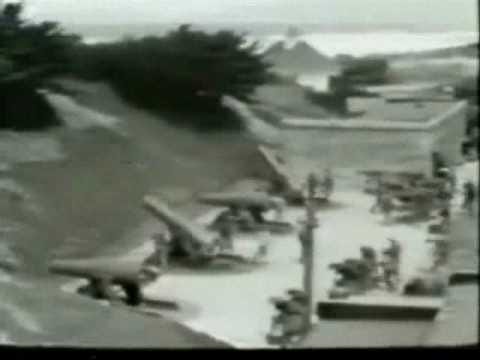Today in History: Corregidor's Invasion Eve
An American's chronicle of the countdown to the invasion of The Rock, 1942
Aaron A. Abston (1916-1992) was the Commanding Officer, Battery G, 60th Coast Artillery Regiment (Anti Aircraft), Corregidor. In his diary entry forMay 5, 1942, he describes the final countdown to the invasion of Corregidor:
The intense enemy activity of the week preceding the fateful night of May 5, 1942, presaged a “Big push” at an early date, and the moon was right for a night attempt, being on the wane-and rising about 3:00 pm.
So when the enemy artillery preparations for the attack began about 8300 pm,’ that night, the thought in every mind and the question on every lip was, “Is this it?” !
The personnel of the battery was in high spirits. Jhat afternoon we had engaged a flight of nine enemy heavy bombers with “Boston” and “Hartford”. He fired one string and suspended fire as the flight turned. ‘he bursts of all batteries appeared to be good. We resumed fire aS Soom as the flight straightened out on its course and continued as long as it was in renge. Our bursts obscured the target. ‘hey were the last bursts fired. “Shortly afterwards the 44 Gua Defense Command announced that ome plane had been seen to fall out of formation and disappeared at sea. Naturally we attributed this plane to our battery as we had been the last in action, and we gloried in ow success.
The men were now scattered about the emplacements lounging in the cool comfort of evening and discussing some mysterious lights wiich had been s een flashing at sea about 7:00 pm and listening with pleasure to the freight-train-like roar of 14″ shells from fort Frank passing directly over our heads at 4 low elevation, bidding revenge against the enemy on Bataan’. they were keeping close to their fox holes, as experience had taught them the dire necessity for it, particularly during our artillery action. About 8:00 pm we heard the guns on Bataan open up with the rapidity of machine gune fire. A shout of alarm was sounded, end everyone dived for cover to wait for the bursts to determine where the barrage was laid. Soon we had our answer: Kindley Field and Bottomside. We heaved a sigh of relief, and I sat on the edge of my command post pit listening to the rumble of the artillery. It was thrilling in its ferocity. suddenly without warning there was a blinding flash and a roa as a large caliber shell, presumably a 240 mm, exploded about
100 yards away. At irregular intervals during the bombardment, these large shells landed about the Golf course and our position, mamy being duds which shook nerves with their ground-jarring thumps. About 10:15 pm after two duds had landed in rapid succession om the upper part of the Golf course, shouts, sounds
of running feet, and then curses as men hit barbed wire entanglements in the dart were heard from the machine gunners manning the anti-paratroop machine guns in that area. Soon the two gunners fell gasping into my pit and requested permission to remaine “hen they caught their breath, I got their story. Ond dud had passed through a tree over their heads and landed a few feet just behind their pit. ‘+he other landed just in front of the pit. Brave men can stand only so much. I had seen these Same two Men only a few days-earlier laugh as they picked bomb fragments from their position and repaired their machinegun and a rifle which had been damaged in their small emplacement while they took shelter there. Now their nerves were gone; I gave my permission for them to remsin With me.
Sometime around 10:00 pm (time is so meaningless and interminable when you are pinned to the ground by artillery fire we heard the first staccato rattle of machine gun from Kindley field and the artillery began to slack off. We guessed then that the”big push”was One Soon reports over our “flash” line verified this. About 11:00 pm the AA Gun Defense Commander called me in person and confirmed these reports. He said that the battery should be prepared to move as infantry reserves on call, meanwhile our previous mission would remain unchanged. ‘The necessary orders were issued and the preparations promptly completed. Personnel was enthusiastic over the possibility of a chance to meet the enemy in close combat.


